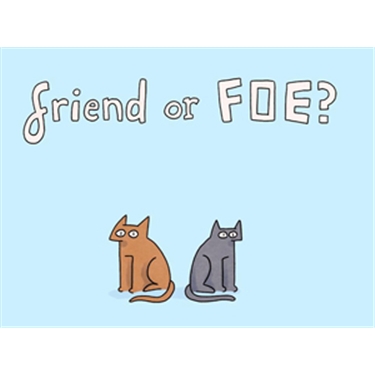Cat owners not in tune with their feline friends
27 September 2015

22 September 2015
Cat owners are mistaking signs of feline fury for those of fondness according to a new study.
The survey by the UK’s leading feline welfare charity, Cats Protection, shows that almost half (45 per cent) of owners with two or more cats are confusing signs of their much-loved moggies at war for signs of feline friendship.
Baffled owners incorrectly thought that cats flattening their ears back, grooming a particular area of their bodies and taking turns to sit in certain areas of the home meant that their kitties were living in harmony.
However, it’s not just a case of cat owners being optimistic and refusing to believe that their furry friends are at war
Two in five (41 per cent) cat owners think that positive behaviours, such as walking around with an upright tail, touching noses, rubbing against each other and fighting with their claws tucked in, are actually signs of negativity.
However, despite the confusion, only 9 per cent of cat owners actually admit to finding it difficult to tell if their cats get on.
“The behaviour of cats is subtle and it’s easy to misread the signs because cats have descended from the African wildcat, a solitary hunter, which didn’t develop the complex facial muscles to show a wide variety of expressions” says Nicky Trevorrow, Cats Protection’s Behaviour Manager. “There are signs that cats like each other but also there are signs they are only tolerating each other or not getting on at all. These signs include spraying, house soiling, over grooming or becoming withdrawn.”
This year, Cats Protection has seen an 18 per cent increase in the number of cats coming to its adoption centres to be rehomed because they do not get along with other cats, and the charity says this is just the tip of the iceberg as this does not include the charity’s 250 volunteer-run branches who also take in unwanted cats.
“At any one time Cats Protection is full to bursting looking after more than 5,000 unwanted cats, so by explaining to owners how they can help their cats to get on better, we hope to improve human-cat relations and thereby reduce the number of cats that are unnecessarily given up to Cats Pro-tection” says Nicky.
Cats Protection advises introducing unfamiliar cats to each other very slowly, so that they have enough time to peacefully integrate with each other. A rushed introduction can often result in cats cohabiting under stress which can lead to behavioural problems and a potentially lifelong conflict between the cats.
If there are two cats already living together that do not get on, this may be because they are from different social groups. To encourage cordiality between the cats, cat owners should provide sepa-rate food, water and litter trays for each cat in different parts of the home so that the cats are not forced to spend time together and can slowly integrate into each other’s lives. Warring cats can often block access to each other’s food, which can cause stress and further weaken their chances of reconciliation.
Nicky will answer owners’ questions in a Q&A session taking place on Cats Protection’s Facebook page on Thursday 24 September (2pm-3pm). To ask Nicky a question on Thursday visit facebook.com/catsprotection
Cats Protection has also created a handy visual animation to give tips on how to spot whether your felines are friends or foe! To view the video please visit Cats Protection’s You Tube page at www.youtube.com/catsprotectionuk
ends
For more information, please contact Smoking Gun PR on cats@smokinggunpr.co.uk or 0161 839 1986.
Notes to editors:
1 The research was conducted by Opinium on behalf of Cats Protection. 1,000 cat owners with two or more cats were surveyed during August 2015
2 Cats Protection is the UK’s leading feline welfare charity and helps over 205,000 cats each year through its national network of over 250 volunteer-run branches and 31 adoption centres.
3 Cats Protection’s vision is a world where every cat is treated with kindness and an understanding of its needs.
4 Cats Protection’s registered charity number is 203644 (England and Wales) and SC037711 (Scotland). Founded by the Cats Protection League in 1927, the charity adopted the same name, Cats Protection in 1998. We ask that you use the name Cats Protection when referring to the charity in all published material.
5. More information about the work of Cats Protection can be found at www.cats.org.uk